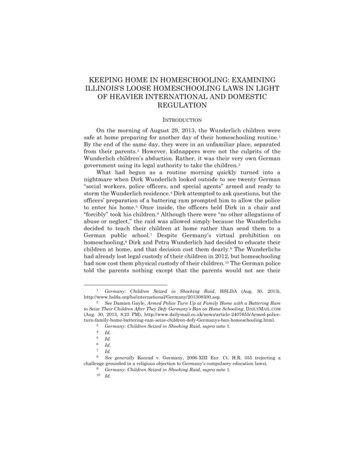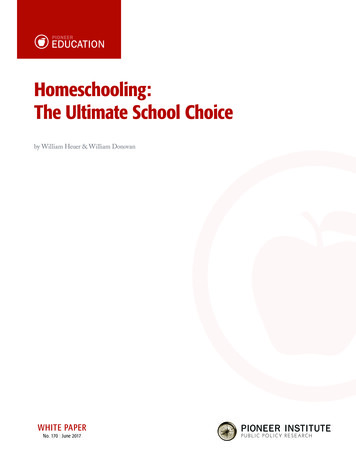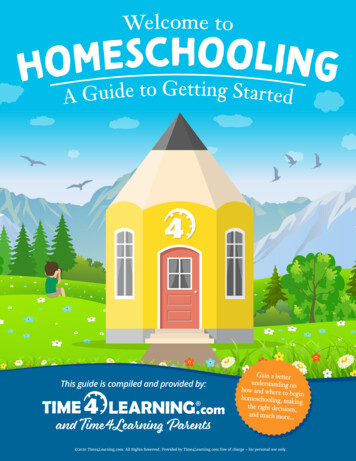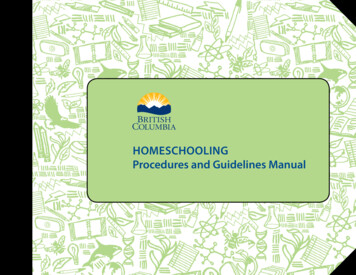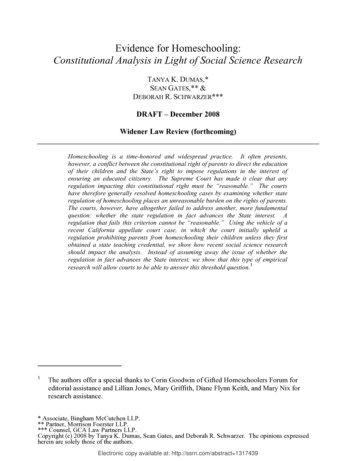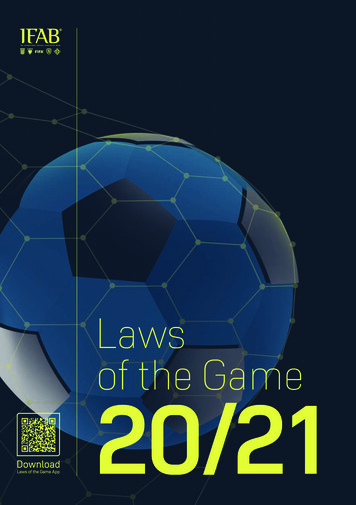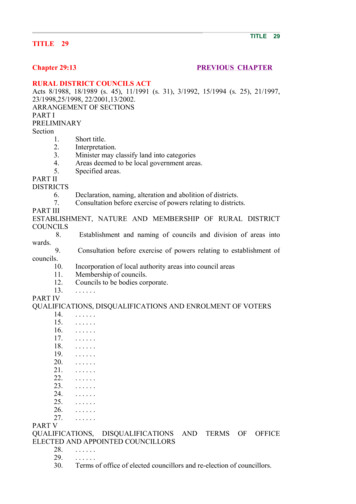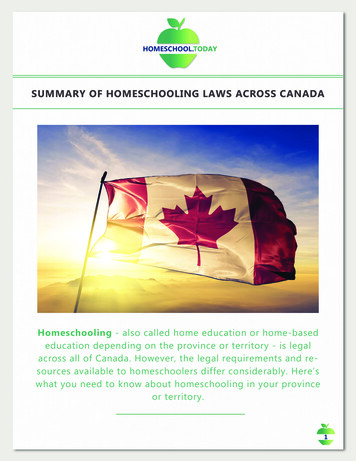
Transcription
HOMESCHOOL.SUMMARY OF HOMESCHOOLING LAWS ACROSS CANADAHomeschooling - also called home education or home-basededucation depending on the province or territory - is legalacross all of Canada. However, the legal requirements and resources available to homeschoolers differ considerably. Here’swhat you need to know about homeschooling in your provinceor territory.1
HOMESCHOOL.Summary of Homeschooling Laws across CanadaAlbertaCompulsory school age: 6 to 16 years.LAW AND POLICYParents wishing to maintain some or all responsibility for their child’s education in Alberta can choose from thefollowing two options:1. Home Education: The parent delivers a home education program to their child under the supervision ofa school authority as per the Home Education Regulation. The parent retains responsibility for makingdecisions about the program; or,2. Shared Responsibility/Blended: Parents and a school authority share responsibility for the child’seducation. The school authority provides planning, resource selection, instructional delivery, assessmentand evaluation of the child’s progress in some courses, which must follow the Alberta Programs of Study.The parent provides the remainder of the program as per the Home Education Regulation. Parentsinterested in Shared Responsibility programs should contact the school offering the program for moredetailed information.The legal requirements to home educate as per option 1 above are found in the Education Act and the HomeEducation Regulation. Home educating parents must:1. Submit a notice of their intent to home educate annually to the supervising board or private school (thiscan be the school board in which the family resides, a willing non-resident school board, or an accreditedprivate school);2. Prepare and submit to the supervising board or private school a home education program plan outlininga list of the planned educational activities, instructional methods and resources used, and how the child isto be evaluated; and,3. Meet with a teacher from the child’s supervising board or private school at least twice per school year tofacilitate evaluations of the student’s progress.Parents can choose whether or not to follow the Alberta Programs of Study in their home education program.If parents opt not to follow the Program of Study, they must certify that their home education program planwill enable their child to achieve the outcomes set out in the Schedule to the Home Education Regulation.2
HOMESCHOOL.Summary of Homeschooling Laws across CanadaCLIMATE AND RESOURCES:Educational choice is well-developed in Alberta. In addition to traditional home education and the SharedResponsibility/Blended options described above, parents can choose a school-delivered education programdelivered at home (the student is taught by a teacher and responsibility for education remains with the school,but education takes place remotely and the child is educated in the home).Parents benefit from the ability to choose a supervising board or private school that is supportive of theirhome educating style and their needs. Families are not limited to working with their local school board but canexplore what each board or private school offers. Supervising boards and private schools include public andCatholic boards, secular private schools, and faith-based private schools.Alberta Education offers funding to defray educational expenses incurred by homeschooling families. Thefunding allotment is over 800.00 per child per school year, and is released through the supervising board orprivate school.British ColumbiaCompulsory school age: 6 to 16 years.LAW AND POLICY:British Columbia is a choice-friendly province for home educators, with two distinct options for educatingchildren at home:1. Registered homeschooling, where the child is registered as homeschooled with a public or independentschool, and parents deliver traditional homeschooling; and,2. Distributed learning (“DL”), where the child is enrolled with a public or independent school, which deliversa distance education/distributed learning program. The BC Ministry of Education considers DL-enrolledstudents to be attending school rather than homeschooling; however, parents continue to be integrallyinvolved in facilitating their children’s education in this option, and education continues to be delivered tochildren at home.3
HOMESCHOOL.Summary of Homeschooling Laws across CanadaThe legal requirements for registered homeschoolers are found in sections 12 and 13 of the B.C. SchoolAct. Home educating parents must register their child by September 30 of each year with one of thefollowing schools: their local public or francophone school, a distributed learning school, or any participatingindependent school. There are no further reporting or documentation requirements for registeredhomeschoolers. School superintendents can investigate registered homeschoolers upon receipt of a report thata registered homeschooler is not receiving an educational program.DL students must meet the BC curriculum Learning Outcomes, are supervised by a licensed teacher, must useschool-approved resources, participate in provincial testing, and have their progress evaluated by a teacher,who also prepares report cards for the student. The choice of public and independent schools for DL studentsmeans that parents can choose the school that best accommodates their educational priorities, from the abilityto choose curriculum to what services the school can offer DL students.CLIMATE AND RESOURCES:British Columbia offers a welcoming environment for homeschoolers. The development of home educationoptions has resulted in greater awareness and acceptance of the concept of alternative forms of education.Public and independent schools in BC aim to offer resources to students educated at home who register orenroll in DL with them.There are many homeschool support groups in BC representing a wide spectrum of home educating interests,such as religious and secular groups and groups for homeschoolers with special needs, as well as regionalsupport groups.Registered homeschoolers are responsible for funding their own curriculum and resources; however, someregistering schools opt to offer some of the funding the school receives for homeschoolers registered withthem to parents for educational expenses incurred. Registered students can also access various assessmentsand resources from their public or independent school. Families choosing to enroll in DL rather than registerwith their public or independent school receive more funding for curriculum and resources than theirregistered counterparts.4
HOMESCHOOL.Summary of Homeschooling Laws across CanadaMANITOBACompulsory school age: 7 to 18 years.LAW AND POLICY:The legal requirements for homeschoolers are found in the Public Schools Act. Home educating parents must:1. Submit the approved homeschool notification form to Manitoba Education’s Homeschooling Officeby September 1st of each school year. The parent must provide an outline of the education program(included on the approved notification form, with space to indicate the program, text, planned units, and/or learning activities in the subject areas of language arts, math, science, social studies, and other); and,2. Submit two progress reports each school year to the Homeschooling Office: one in January and one inJune.Families are assigned a “liaison” at the Homeschooling Office. The liaison may contact families regardingprogram outlines or progress reports. Some liaisons request a home visit to homeschooling families they workwith; however, these visits are not specifically required by homeschooling provisions of the Public Schools Act.CLIMATE AND RESOURCES:Manitoba is a more relaxed province in which to homeschool. There are a number of provincial associationsand local support groups. Parents can negotiate enrollment in some courses at public or independent schoolsif they wish and the school agrees to the arrangement. Families are not required to use Manitoba curriculum,but can select curriculum as they wish. They are responsible for the cost of homeschooling resources;homeschoolers do not receive funding or reimbursements.5
HOMESCHOOL.Summary of Homeschooling Laws across CanadaNEW BRUNSWICKCompulsory school age: 5 to 18 years.LAW AND POLICY:The New Brunswick Education Act mandates that the Minister of Education shall exempt a child from attendingschool where the Minister is satisfied that the child is “under effective instruction elsewhere” (Section 16(2)). Aparent wishing to homeschool in New Brunswick must apply for exemption from compulsory attendance bysubmitting the Annual Home Schooling Application Form to the local school district (there are four anglophoneand three francophone districts) by September 15th.The Annual Home Schooling Application Form contains an indemnity acknowledging that the child will not bereceiving services from the school system. The indemnity also includes a statement that the parent accepts fullresponsibility for the effective instruction of their child and declares that the instruction will include a numberof components, including a detailed list of “subjects that comprise a well-rounded curriculum.” Parents shouldreview this indemnity and declaration carefully when planning curriculum and resources for their home school.There are currently no other regulations addressing homeschooling in New Brunswick.CLIMATE AND RESOURCES:New Brunswick is a more relaxed province in which to homeschool, with few legislative requirements fordocumentation and reporting. School district policies differ slightly on requirements, however. Some schooldistricts have developed further policy regarding when they will investigate a family’s homeschooling. Thefrancophone school districts regularly request meetings with the family, where the anglophone districtsgenerally request meetings only in the event of an investigation, if they receive a report that a student is notunder “effective instruction.”The legislation does not require schools or districts to offer resources or services to homeschoolers. Parentscan request an arrangement to borrow some educational materials from schools for a one-year period. Parentswishing to arrange their homeschooled child’s attendance at some courses or involvement in school events andactivities must be negotiated with the school. There is no provincial funding for homeschooling families.6
HOMESCHOOL.Summary of Homeschooling Laws across CanadaNEWFOUNDLAND & LABRADORCompulsory school age: 6 to 16 years.LAW AND POLICY:Homeschooling in Newfoundland and Labrador is regulated by the Public School Act, which excuses ahomeschooled student from compulsory attendance at school where “with the prior written approval of thedirector, (the student) is under instruction satisfactory to the director, at home or elsewhere, for a periodspecified by the director” (S. 5(c)). Homeschooling families must apply for exemption from one of NL’s twoschool districts - either the anglophone or the francophone school district - each year (S. 7).While there are no enacted regulations governing the procedure and policy for directors, the anglophoneschool district (the Newfoundland and Labrador English School District or NLESD) has developed its ownpolicy with a detailed list of requirements for families wishing to homeschool. The policy designates one HomeSchooling Coordinator for each of the NLESD’s four regions, limits curriculum choices to “those curricula thathave been approved” by the Department of Education (parents wishing to use alternate curriculum mustrequest an assessment of the curriculum), and requires parents to submit progress reports and work samples(the number required depends on how long the parent has been homeschooling). Meetings with the family arealso recommended in the policy.CLIMATE AND RESOURCES:Under the current school district policies, homeschooling in Newfoundland and Labrador is quite regulatedand has a number of restrictions and requirements unique to this province. There are several regional and localhomeschool support groups in NL to assist homeschooling families. The Department does not offer fundingto homeschoolers, but policies allow for resources to be offered under conditions set out in the school policy.Homeschooled students may be able to access school services and extracurriculars at the school depending onschool policy.7
HOMESCHOOL.Summary of Homeschooling Laws across CanadaNOVA SCOTIACompulsory school age: 5 to 16 years.LAW AND POLICY:Home education in Nova Scotia is regulated by the Education Act and the Governor in Council Education ActRegulations made under the Education Act. Parents intending to provide a home education program must:1. Submit the Home Schooling Registration Form to the Department of Education and Early ChildhoodDevelopment before September 20th of each school year. The parent must identify the proposed homeeducation program on the Registration Form, which has space to describe the parent’s plan for Englishlanguage arts, math, social studies, science, and other programs/activities; and,2. Submit the Home Schooling Progress Report form, in which the parent comments on the child’s progressin the above five subject areas, to the Department of Education by June of each school year.The Act does authorize the Department to request evidence of a homeschooled child’s educational progressusing one of the following (chosen by the parent): standardized test results, an assessment from a qualifiedassessor, or a portfolio of the child’s work. Such evidence is not generally requested unless the Department hasconcerns about the home education program.CLIMATE AND RESOURCES:Nova Scotia is a relaxed province in which to homeschool, with straightforward requirements for submissionof homeschool documentation to one central office at the Department of Education rather than multipleschool boards. There are many active support groups with a wide range of activities and interests, and severalprovincial homeschooling associations to assist homeschooling families.The Department of Education does not provide funding or curriculum resources to homeschooling families,although curriculum guides are available on the Department’s website.Parents can negotiate their homeschooled child’s attendance at some courses with the principal of their localschool. Homeschooled students can access accredited correspondence courses, such as those offered throughthe Nova Scotia Correspondence Studies program. Homeschooled students can also contact the Department ofEducation to request that the Department arrange for the homeschooled student to write Advanced Placementtests.8
HOMESCHOOL.Summary of Homeschooling Laws across CanadaONTARIOCompulsory school age: 6 to 18 years.LAW AND POLICY:A child may be excused from attending school if they are “receiving satisfactory instruction at home orelsewhere” (Section 21(2)(a) of the Ontario Education Act). While Ontario law does not mandate progressreports or standardized testing for homeschoolers, Ministry of Education Policy/Program Memorandum No.131 (PPM-131) contains further guidance to school boards and schools regarding homeschooling.Parents homeschooling in Ontario should review PPM-131 carefully. PPM-131 sets out guidelines for parentson how to notify the school board that a child is being homeschooled, how the school board should respond,when a school board is justified in investigating a family’s homeschooling, and how a school board shouldconduct such an investigation.CLIMATE AND RESOURCES:Homeschooling is well-established in Ontario, and there is a large support network. Homeschoolers canconnect with many homeschooling organizations, both provincial associations and local groups, for supportin their homeschooling journey. While homeschooling families do not currently receive any tax credits orsubsidies, some school boards, particularly in rural areas, are amenable to part-time attendance arrangementswith homeschoolers. Ontario is, overall, a friendly province in which to homeschool.9
HOMESCHOOL.Summary of Homeschooling Laws across CanadaPRINCE EDWARD ISLANDCompulsory school age: 6 to 16 years.LAW AND POLICY:In Prince Edward Island (PEI), homeschooling is regulated by the Education Act and the Home EducationRegulations. Parents intending to provide a home education program must submit the following to theDepartment of Education:1. The approved notification form stating the parent’s intention to provide a home education program inaccordance with the regulations; and,2. A declaration that the parent acknowledges his or her responsibilities related to the provision of the homeeducation program.These responsibilities are set out in the Home Education Regulation: “A parent who provides a home educationprogram to his or her child has a responsibility to ensure, to the best of his or her ability, that the child has anopportunity to acquire knowledge and develop skills that will prepare the child for life as an adult.” Parents arenot required to submit further documentation; however, the Department of Education may provide advice andcomments to the parent on the home education program.The Minister may provide authorized textbooks to a parent for use in a home education program. A refundabledeposit of 50 for the textbooks is required.CLIMATE AND RESOURCES:PEI is a relaxed province in which to home educate, with simple and straightforward requirements. Thehomeschooling community is small, but active and growing.While the Department does not offer subsidies for homeschooling materials, parents can request access toauthorized textbooks with a small refundable deposit.10
HOMESCHOOL.Summary of Homeschooling Laws across CanadaQUEBECCompulsory school age: 6 to 16 years.LAW AND POLICY:Quebec is one of the most regulated provinces in which to homeschool.Quebec’s homeschooling law and regulatory framework changed significantly in 2017, and again in 2018, withthe passage of Bill 144, the Homeschooling Regulation, and the Amendment to the Homeschooling Regulation.Under the current law and regulation, parents homeschooling in Quebec must:1. Notify the Direction de l’enseignement à la maison (the “DEM”) - the homeschooling office at the Ministryof Education - and their school board that they are homeschooling in July of each school year;2. Prepare and submit to the DEM a “learning project,” which details the educational plan for each child;3. Prepare and submit a status/midterm report on the child’s progress;4. Prepare and submit a completion report at the end of the school year;5. Attend a monitoring meeting with their resource person from the DEM at a time arranged by the parentand the DEM resource person during the school year. The child must attend this meeting; and,6. Arrange for a third-party evaluation of the child’s progress each year, chosen from one of five options(which include evaluation of the child’s portfolio by the DEM, and an evaluation of the child’s progress bya licensed teacher - the two most commonly chosen options).Beginning in the 2021/2022 school year, homeschooled children are also required to write Quebec’s Ministerialexaminations.CLIMATE AND RESOURCES:The Quebec homeschooling community has continued to grow and thrive, despite the stress of substantialchanges to the regulatory framework for homeschooling twice in just two school years. The DEM is in regularcommunication with homeschooling associations representing the majority of homeschoolers in Quebec.The associations actively assist members in working through the new requirements, and advocate for theirmembers with the DEM and the Ministry of Education.Practical supports and resources for homeschoolers are currently quite limited in Quebec. The HomeschoolingRegulation contains a number of provisions describing support that school boards must provide tohomeschooling families, including access to school facilities, services such as psychoeducational evaluationsand special education support, and resources such as textbooks. However, the Regulation permits schoolboards to determine access to these supports “subject to availability” and “on the conditions (the school board)determines.” Many homeschoolers have reported difficulty in accessing these supports from their school11boards.
HOMESCHOOL.Summary of Homeschooling Laws across CanadaSASKATCHEWANCompulsory school age: 7 to 15 years.LAW AND POLICY:In Saskatchewan, home-based education is regulated by the Education Act and the Home-based EducationRegulations. The Saskatchewan Home-based Education Policy and Procedures Manual further develops andclarifies policies and procedures for home-based education.Parents intending to provide a home-based education to their children must:1. Notify a registering authority - one of Saskatchewan’s twenty-seven school divisions - of their intention toregister a home-based education program;2. Prepare and provide to the registering authority a written education plan (a “WEP”). The WEP shouldidentify the philosophical approach to the program; the learning materials; at least three broad annualgoals for language arts, math, science, and social studies; and how the parent will assess progress;3. Maintain a portfolio of work each year for each child, and preserve the portfolio for at least two calendaryears after the end of the school year; and,4. Prepare and provide to the registering authority an annual progress report at the end of each schoolyear. This report should include either a portfolio of work or test results (further detailed in the Policy andProcedures Manual).The registering authority reviews the parent’s WEP with a view to ensuring that it is not inconsistent with theGoals of Education for Saskatchewan and not inappropriate for the age and ability of the home-based student.CLIMATE AND RESOURCES:The language in Saskatchewan’s Policy Manual is very positive towards home education, and acknowledges theunique nature of each home-based education program. The Saskatchewan home-based education legislativeframework is one of the most thoroughly developed in Canada. However, the twenty-seven school divisionswho serve as registering authorities vary in their policies for home-based educators. Home-based educatorsin Saskatchewan register with the school division in which they reside, and some school divisions are easier towork with than others.School divisions receive funding from the Department of Education for the home-based students who registerwith them. Each school board has a different policy on how this funding is shared with home-based educators,who must contact their school division for information about the amount of funding available and how it canbe used.12
HOMESCHOOL.Summary of Homeschooling Laws across CanadaNORTHWEST TERRITORIESCompulsory school age: 6 to 16 years.LAW AND POLICY:Homeschooling in the Northwest Territories is regulated by the Education Act and the Home SchoolingRegulations. Parents intending to provide a homeschooling program are required to:1. Register the homeschool program with a school every year;2. Meet with the school principal to provide a sampling of assessments showing the student’s progress andto discuss the student’s progress twice per school year.The Home Schooling Directive notes that “The responsibility of the principal is to ensure the student ismaking progress in the program, and support the home schooling program wherever possible, as agreed uponwith the parent.”The Home Schooling Regulations set out a detailed process for addressing any concerns a principal may haveregarding a homeschooling program.CLIMATE AND RESOURCES:The Territories’ homeschooling groups may be smaller and more localized, but they’re active. Families connecton social media and get together for sports, meetups, and events.Funding for homeschooling families is generous in the Territories. Families who have registered and areapproved by September 30th of each school year can request reimbursement for eligible educationalexpenses incurred, up to nearly 4,000.00 per student per year. Access to school facilities and resources can benegotiated with the school, as can homeschooled students’ part-time attendance at school.13
HOMESCHOOL.Summary of Homeschooling Laws across CanadaYUKONCompulsory school age: 6 to 16 years.LAW AND POLICY:Homeschooling in the Yukon is regulated by the Education Act and the Home Education Regulations. Parentswho wish to provide a homeschooling program must:3. Register the home education plan with the Minister, which is done through Aurora Virtual School (“AVS”).AVS has delegated responsibility for approving and monitoring home education in the Yukon; and,4. Prepare a three-year educational plan for each child being home educated and submit it to AVS. This planmust comply with the goals and objectives of S. 4(a)(i) of the Education Act.The three-year educational plan should consist of a detailed one-year plan for the student’s education,including specifics of the intended learning activities, plus a broad statement identifying goals for the followingtwo years.A home-education program can be entirely home-based (traditional homeschool), or a blend ofhomeschooling and cross-enrollment in some courses at a local public school or at AVS.CLIMATE AND RESOURCES:AVS offers practical support to home-educating parents in a number of ways. Parents can request accessto testing for their children, use of school facilities, and access to educational materials through AVS. Homeeducated students may also be permitted to attend courses offered by the school board provided certainconditions have been met.Funding is available to reimburse parents for the costs of educational materials, up to 1,200.00 per year perchild.14
HOMESCHOOL.Summary of Homeschooling Laws across CanadaNUNAVUTCompulsory school age: 6 to 18 years.LAW AND POLICY:Homeschooling in Nunavut is regulated by the Education Act, the Home Schooling Regulation, and the2016 Homeschooling Reimbursements by DEAs/CSFN operational directive. Parents who wish to provide ahomeschooling program must:1. Be under the supervision of a district education authority (DEA) by registering the home schoolingprogram with a school;2. Ensure that the homeschooling program fulfils the curriculum standards set by the Minister for theeducation program; and,3. Meet with the school principal to provide a sampling of assessments showing the student’s progress andto discuss the student’s progress twice per school year.The Act explicitly permits a homeschooling parent to share responsibility for homeschooling with otherhomeschooling parents. Homeschooling programs are evaluated by a DEA with the assistance of the schoolprincipal. Supervision of homeschooling programs must be “in accordance with Inuit societal values andthe principles and concepts of Inuit Qaujimajatuqangit,” according to section 21(2) of the Education Act.Homeschooled students are expected to participate in reviews of their program with the parent and theprincipal.CLIMATE AND RESOURCES:Nunavut’s homeschooling community is one of the smallest in Canada, but the territory offers a number ofresources to its homeschoolers.The 2016 operational directive allows for reimbursement of up to 1,000 per child per year for specified costsassociated with homeschooling. Principals are also required by the directive to make program materials andschool facilities available to homeschooled children, as well as membership in sports teams, school groups, andclubs.This document is a summary of the current legislative framework relating to homeschooling in Canada, andit is provided as an information service. It is current only as of the date of the summary and does not reflectsubsequent changes in the law. The summary is distributed with the understanding that it does not constitutelegal advice or establish a solicitor/client relationship by way of any information contained herein. Thecontents are intended for general information purposes only and under no circumstances can be relied uponfor legal decision-making. Readers are advised to consult with a qualified lawyer and obtain a written opinionconcerning the specifics of their particular situation. (As of April 25, 2020)15
2. Submit two progress reports each school year to the Homeschooling Office: one in January and one in June. Families are assigned a "liaison" at the Homeschooling Office. The liaison may contact families regarding program outlines or progress reports. Some liaisons request a home visit to homeschooling families they work
